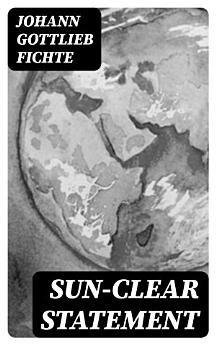Sun-Clear Statement
Johann Gottlieb Fichte
2022. g. aug. · DigiCat
E-grāmata
81
Lappuses
family_home
Piemērota
info
reportAtsauksmes un vērtējumi nav pārbaudīti. Uzzināt vairāk
Par šo e-grāmatu
In 'Sun-Clear Statement,' Johann Gottlieb Fichte presents an erudite examination of transcendental idealism, an edifice upon which much of German philosophical thought of the time rested. The work is characterized by Fichte's precise and assertive prose which maneuvers through complex conceptual landscapes with the aim of delineating the scope and position of the newest philosophy within its rightful boundaries. By engaging directly with the reader, Fichte strives to clarify the most abstruse elements of his argumentation, insisting that his text serves as an elucidation rather than an expansion of philosophical doctrine. The literary style is rigorous and demanding, embedded within the philosophical discourse of the Enlightenment and early Romantic periods, making pronounced strides in the understanding of subjective consciousness and its role in the formation of knowledge. Johann Gottlieb Fichte, a formidable figure in German philosophy, informs 'Sun-Clear Statement' with his deep engagement in the intellectual discourse of his time. His commitment to the clarification and defense of transcendental idealism mirrors his broader philosophical ambitions to develop a system that fully accounts for the interrelations between the self and reality. Fichte's own scholarly journey, marked by studied interactions with the works of his contemporaries and predecessors, imbues this treatise with a sense of intellectual urgency, aiming to elucidate the true import of philosophy as an argumentative practice rather than a mere collection of philosophical concepts. For scholars and enthusiasts of philosophical literature, 'Sun-Clear Statement' is not only an essential reading but an intellectual challenge poised to refine one's conception of philosophy. Fichte's book comes highly recommended to anyone invested in the history of philosophical thought, particularly those keen on understanding the evolution of idealism and its impact on subsequent metaphysical and epistemological developments. The text is a testament to Fichte's enduring legacy as a thinker who, through the sheer force of his argumentation, seeks to bring the reader into a clearer understanding of philosophy's terrain within the human intellect and experience.
Par autoru
Johann Gottlieb Fichte was a seminal figure in German philosophy, born on May 19, 1762, in Rammenau, Saxony. A forefront intellectual during the late 18th and early 19th centuries, Fichte attended the University of Jena where his acquaintance with the works of Kant profoundly shaped his own thinking. He is often regarded as a key figure in German Idealism, expanding on Kant's critical philosophy to form his unique transcendental perspective. Fichte's philosophy emphasizes the active, spontaneous nature of the subject, often presented through a rigorous, almost axiomatic method, culminating in an ethical system where freedom is central. His philosophy laid the groundwork for later developments in existential and phenomenological thought, influencing philosophers such as Schelling and Hegel. His work 'Sun-Clear Statement,' though less well-known compared to his 'Science of Knowledge' (Wissenschaftslehre), continues to demonstrate his intricate analysis of knowledge and subjectivity. Fichte's literary style is characterized by a dense, challenging exposition, and by the attempt to synthetize a thorough account of consciousness and experience. His legacy extends beyond philosophy, as his ideas also resonated within the movement for German nationalism. Fichte's bold proclamation of the self-reliant 'I' and call for a moral populace made him one of the most provocative political thinkers of his time. He passed away on January 27, 1814, in Berlin, leaving behind a rich, complex body of work that continues to inspire philosophical debate.
Novērtējiet šo e-grāmatu
Izsakiet savu viedokli!
Informācija lasīšanai
Viedtālruņi un planšetdatori
Instalējiet lietotni Google Play grāmatas Android ierīcēm un iPad planšetdatoriem/iPhone tālruņiem. Lietotne tiks automātiski sinhronizēta ar jūsu kontu un ļaus lasīt saturu tiešsaistē vai bezsaistē neatkarīgi no jūsu atrašanās vietas.
Klēpjdatori un galddatori
Varat klausīties pakalpojumā Google Play iegādātās audiogrāmatas, izmantojot datora tīmekļa pārlūkprogrammu.
E-lasītāji un citas ierīces
Lai lasītu grāmatas tādās elektroniskās tintes ierīcēs kā Kobo e-lasītāji, nepieciešams lejupielādēt failu un pārsūtīt to uz savu ierīci. Izpildiet palīdzības centrā sniegtos detalizētos norādījumus, lai pārsūtītu failus uz atbalstītiem e-lasītājiem.







